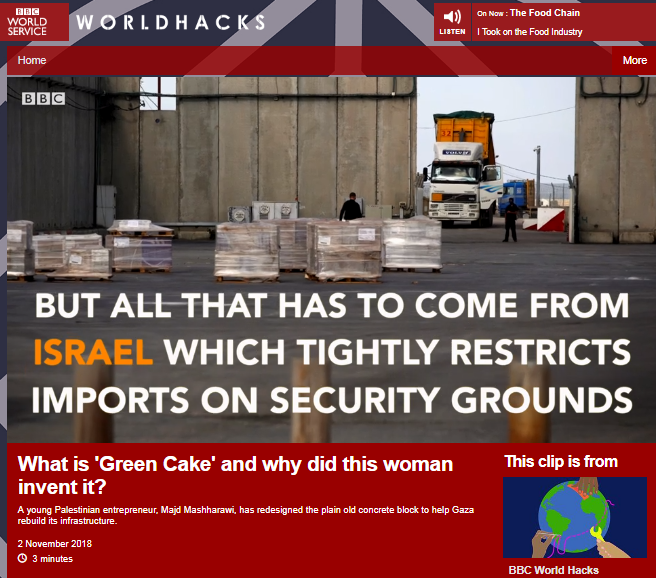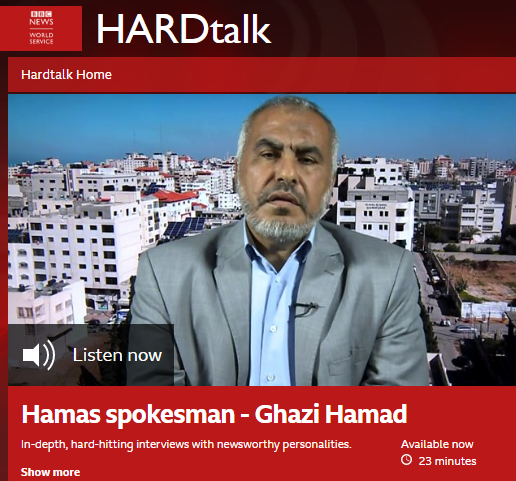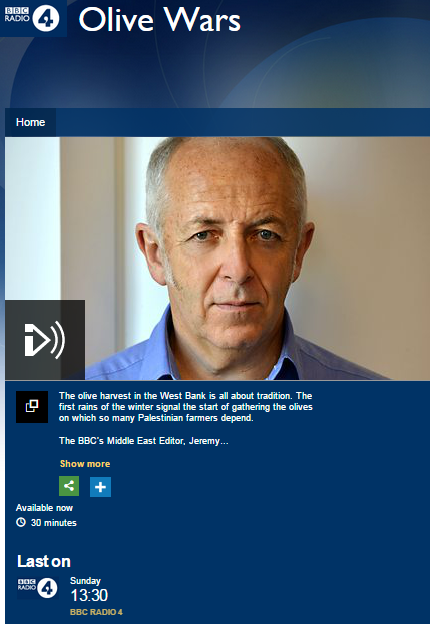Since the end of the summer 2014 conflict between Israel and terror groups including Hamas, the BBC has repeatedly told its audiences of “tight border restrictions” affecting the import of construction materials into the Gaza Strip.
“And there are no new building materials that are coming in. Israel has long imposed tight border restrictions on Gaza, saying they’re needed for security and since the ceasefire nothing’s changed. Aid agencies say a rethink is urgently needed. There would still be a housing crisis even if Israel fully opened its one commercial crossing.” [emphasis added] Yolande Knell, BBC News, September 2014
“…but the Israeli blockade of Gaza remains in place. Now that is a blockade by air, land and sea. It is Israel which decides which trucks and how many and carrying what goods are allowed in and out of Gaza. There are serious concerns being expressed by aid agencies about whether or not Israel will allow enough construction materials in. A temporary mechanism has been agreed and that will involve monitoring by the United Nations but they are literally almost at the level of counting the grains of sand going in and out of Gaza and there are serious fears that the volume of cement and construction materials that would be required will simply not be allowed in. Israel of course views cement as a dual-use item and it has been used by Hamas to build tunnels right out of Gaza under the ground into Israeli territory, so cement is particularly carefully monitored.” Orla Guerin, BBC World Service radio, October 2014
“Donors have pledged more than $5bn but Israel strictly regulates the import of building materials and equipment into the Palestinian territory. They say that militants could use the equipment to carry out attacks.” Yolande Knell, BBC News, December 2014
“Israel and Egypt maintain tight border restrictions on the coastal enclave, which have severely hampered reconstruction efforts. They say these are needed for security.” [emphasis added] Yolande Knell, BBC News, July 2015
As has been noted here on numerous occasions, millions of tons of construction materials have in fact been transported into the Gaza Strip since the summer of 2014.
However, the BBC has shown considerably less interest in informing its audiences of important factors which have affected the pace of repair and reconstruction in the Gaza Strip such as the failure of many donors to meet their pledges, the black market in building supplies, the lack of Palestinian Authority cooperation and Hamas’ theft and misappropriation of building materials for the purpose of terror – not least cross-border attack tunnels.
On November 2nd the BBC World Service put out a filmed report concerning a building material developed by a Gaza civil engineer which was also promoted on the BBC News website’s ‘World’ and ‘Middle East’ pages.
Titled “What is ‘Green Cake’ and why did this woman invent it?“, the report by Richard Kenny informed BBC audiences that “[a] young Palestinian entrepreneur, Majd Mashharawi, has redesigned the plain old concrete block to help Gaza rebuild its infrastructure”.
Viewers were told that “[w]ars with Israel have led to widespread destruction” and that the concrete blocks conventionally used for building:
“…are usually made from cement, sand and gravel (or aggregate). But all that has to come from Israel which tightly restricts imports on security grounds.”
In other words, the only information provided to BBC audiences regarding the background to this story refrained from informing them of any of the factors affecting repair and reconstruction in the Gaza Strip which are not connected to Israel and failed to clarify that the supervision of imports of dual-use goods – rather than “imports” in general – had to be put in place as part of counter-terrorism measures.
Had BBC audiences been informed of the complete story behind the topic of building in the Gaza Strip over the past four years, they may have been able to fill in the gaps in this film for themselves. Unfortunately, that has not been the case.
Related Articles:
How Hamas put a tax on building materials the BBC told audiences don’t exist
Even the Guardian goes where the BBC refuses to tread
Hamas man spills beans on appropriation of construction materials: BBC silent
BBC News ignores yet another story about Hamas appropriation of construction materials
A side to the Gaza reconstruction story the BBC isn’t telling
Some context to the BBC’s ‘reporter in the Gaza rubble’ features
BBC ignores Hamas theft of construction materials yet again



